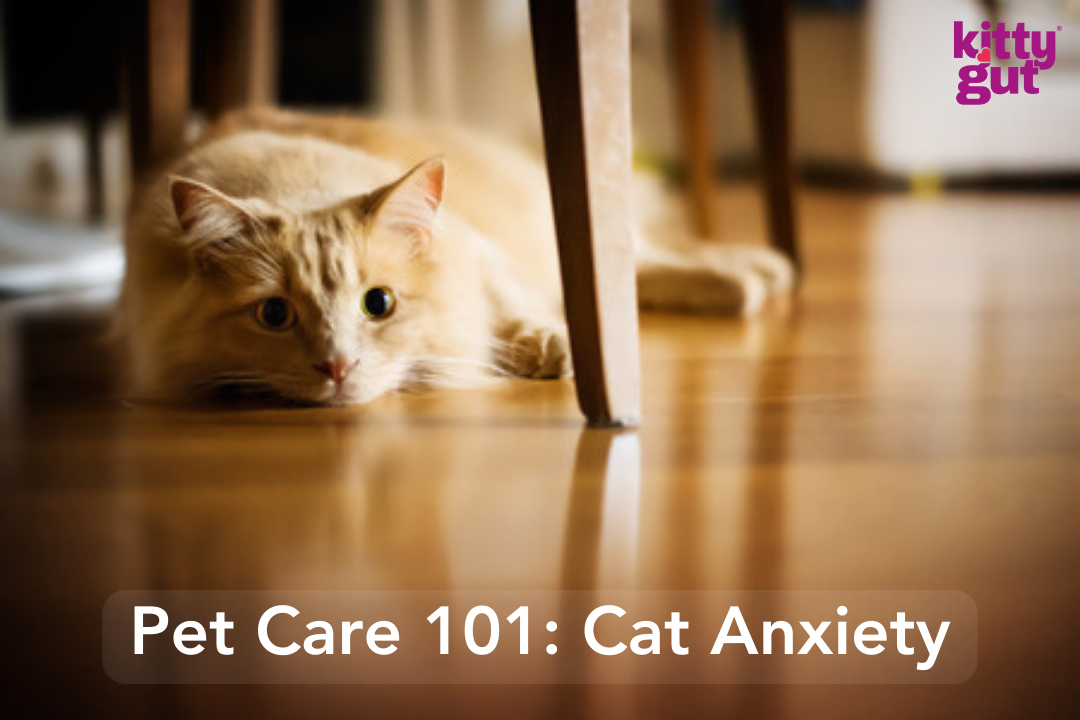
The Gut-Anxiety Connection in Cats: What You Need to Know
Share
In the realm of pet care, the significance of gut health is garnering increasing attention. Beyond just digestion, emerging research suggests that the gut microbiome – the community of microorganisms residing in the digestive tract – could play a pivotal role in influencing not just physical health, but also mental well-being. Surprisingly, this holds true for our cats as well.
If you've ever noticed your cat exhibiting signs of anxiety, such as excessive hiding, aggression, or inappropriate elimination, you might wonder what factors beyond environmental stressors could be at play. Recent studies indicate that the composition of a cat's gut microbiome might be one such influential factor.
Understanding the Gut Microbiome-Anxiety Link

The gut microbiome is a complex ecosystem comprising trillions of bacteria, fungi, viruses, and other microorganisms. Its role extends far beyond digestion; it actively communicates with the brain through the gut-brain axis, a bidirectional pathway linking the central nervous system with the enteric nervous system of the gastrointestinal tract.
Research in both humans and animals has demonstrated that disturbances in the gut microbiome, known as dysbiosis, can lead to a range of health issues, including anxiety and other mood disorders. In cats, this connection appears to hold true as well.
Studies in felines have revealed that those with dysbiosis exhibit more anxious behaviors and altered levels of stress-related hormones compared to those with a healthy gut microbiome. This suggests that maintaining a balanced gut microbiome could be crucial for promoting mental well-being in cats.
Supporting Your Cat's Gut Health

So, how can you support your cat's gut health and potentially alleviate anxiety? While more research is needed to fully understand the intricacies of the gut-anxiety connection in cats, there are several steps you can take to promote a healthy gut microbiome:
- Nutrition: Providing your cat with a balanced diet rich in high-quality protein, fiber, and essential nutrients is essential for gut health. Look for cat foods formulated to support digestive health, and consider incorporating probiotic-rich foods such as yogurt or kefir (in moderation) into their diet.
- Exercise: Regular physical activity not only keeps your cat physically fit but also promotes gut motility and overall digestive health. Interactive play sessions and environmental enrichment can help keep your cat mentally stimulated and physically active.
- Probiotic Supplementation: In some cases, adding a probiotic supplement specifically formulated for cats to your pet's daily routine may help promote a healthy balance of gut bacteria. However, it's important to consult with your veterinarian before introducing any new supplements to your cat's regimen.
- Stress Management: Minimizing stressors in your cat's environment and providing a safe, secure space for them to retreat to when feeling anxious can help reduce the risk of gut-brain axis dysregulation. Consider utilizing pheromone diffusers or calming aids to create a soothing atmosphere for your cat.
Seeking Professional Guidance

While promoting a healthy gut microbiome is undoubtedly beneficial for your cat's overall well-being, it's essential to recognize that it's not a cure-all for anxiety or other behavioral issues. If your cat is displaying signs of anxiety or experiencing ongoing behavioral challenges, it's crucial to seek guidance from a veterinarian or a veterinary behaviorist.
A comprehensive evaluation can help identify any underlying medical conditions or environmental stressors contributing to your cat's anxiety. From there, a tailored treatment plan, which may include behavioral modification techniques, medication, or dietary adjustments, can be developed to address your cat's specific needs.
The gut microbiome-anxiety connection in cats underscores the intricate interplay between physical and mental health in our cats. By prioritizing your cat's gut health through proper nutrition, exercise, and stress management, you can help support their overall well-being and potentially reduce the risk of anxiety-related issues.
Remember, every cat is unique, and what works for one may not work for another. Stay attentive to your cat's behavior and consult with veterinary professionals as needed to ensure they receive the best possible care. With proactive measures and informed guidance, you can help your cat lead a happy, healthy life free from unnecessary anxiety.